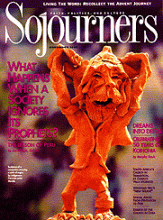The recent bloodbath in Bisho (Ciskei), following on the Boipatong massacre a few months earlier, has sent a sobering message to the nation. Unless South Africans are able to put an end to the violence, the country is doomed to become another Bosnia-Herzegovina, Beirut, Sudan, or Ethiopia--little more than just another no-hope basket case, to be sent occasional food aid. It is partly this that makes negotiations the only viable option for all concerned.
A pertinent question is whether Christians have a healing ministry to offer. Prior to February 2, 1990, the church was actively involved at the center of resistance politics. The unbanning of the liberation movements and the release of Nelson Mandela have changed this, with the church having increasingly adopted a more neutral and passive political role.
An Image That Haunts
The reality of this change was seen on television screens around the world the day after Nelson Mandela was released from prison. He had spent his first night of freedom at Bishopscourt in Cape Town. The next morning under the focus of the cameras, Archbishop Desmond Tutu escorted Mandela to his car, prayed for him, and sent him on his way. "I can now get on with the work of the church," Tutu told reporters.
The image haunts church social activists. Despite the important role still played by the archbishop, grassroots Christians are no longer sure of their role. "Before we simply got out there and disrupted things...we made the place ungovernable," observed a young member of a township church. "Now we don't know what the hell to do!"
The Spiral of Violence
Read the Full Article

